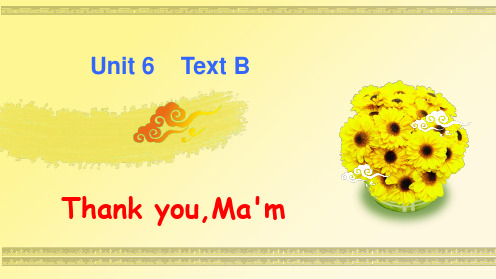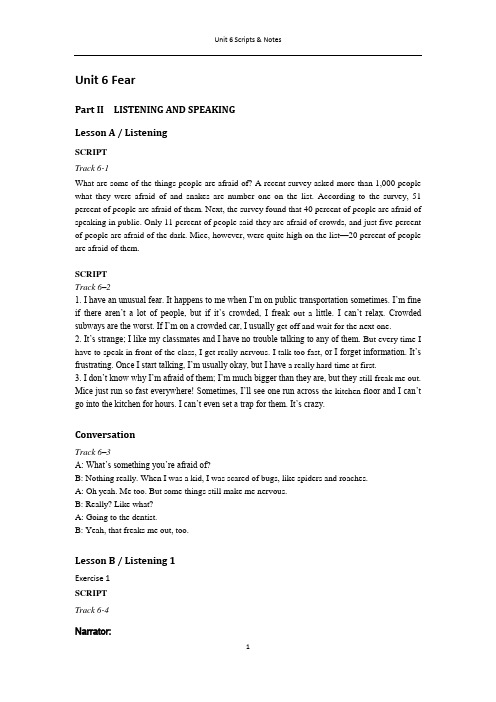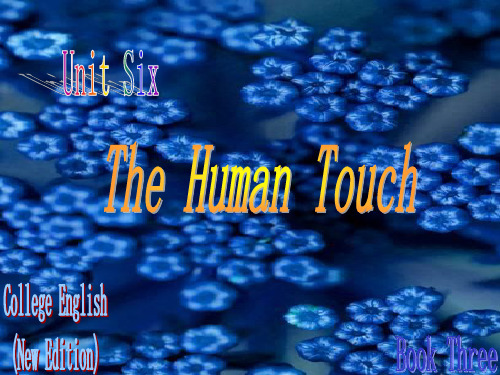unit 6全新版大学英语第3册第6单元,课件
综合英语教程3-Unit06课件

Book 3-Unit 6
Task 1 Role play—I’d like to buy … Task 2 Making a bargain Task 3 Picture description
Book 3-ay—I’d like to buy …
Book 3-Unit 6
3. What did the speaker worry about after she bought the chair? She and her husband had decided that if they wanted to buy anything that cost over one hundred dollars, they should consult each other. In the end, she bought the chair without mentioning it to him, so she was worried in case he wouldn’t approve of her purchasing the chair, and to make matters worse, the chair couldn’t be returned.
Book 3-Unit 6
People in a Shop
shop owner boss manager shopkeeper shop assistant (sales assistant) cashier (收银员) customer shopper buyer
Book 3-Unit 6
Book 3-Unit 6
on the market for sale on sale discount 50% off haggle over the price (讨价还价) paying on credit paying with a debit card swipe one’s card through a POS machine
全新版大学英语第三册课件(完整版)

Freedom and Rights
Freedom of the individual is considered one of the essential features of western civilization, which itself is sometimes called the Free World. This freedom is often expressed in terms of rights to do certain things or to be treated in a particular way. In Britain and the US the most basic rights include freedom of expression, of choice and of worship.
Unit two
Civil-Rights Heroes
Text A
Ferqus M.Bordewich
Background InFfreoerdomm aantdiRoignhts
The Civil Rights Movement
Martin Luther King , Jr.
Uncle Tom's Cabin The Underground Railroad in Canada
Yale University in New Haven, Connecticut
Individual Retirement Account
Individual Retirement Account refers to a US government plan that allows people to put part of their income into special bank accounts. No tax has to be paid on this money until they retire. In fact, “ IRA” is used more often.
全新版大学英语综合教程3 unit6 textB

Thank you,Ma'm
in contact with 与某人在接触(或联系中) 与某人在接触(或联系中) 相关短语: ...失去联系 相关短语:out of contact with 与...失去联系 switch on/off 打开/ 打开/关掉 get/have...in common 共有 相关短语: ...一样 相关短语:in common with 与...一样 out of the common 不寻常的 grab/take/catch hold of 抓住
Thank you,Ma'm
snach n.片段 vt. 1.夺,夺走 片段 夺 eg:The robber snatched her purse and ran off. 2.一下子拉 一下子拉, 2.一下子拉,一把抓住 3.抓住机会做 抓住机会做, 3.抓住机会做,抽空做 eg:Peter is quick at snatghing an opportunity. 相关词组: 相关词组:snatch at 试图抓住 make a snatch at 抢夺 by snatches 断断续续地
Unit 6
Text B
Thank you,Ma'm
Thank you,Ma'm
Lecture Outlines: :
• • • •
Text background Word Structure Sentences
Thank you,Ma'm
Hughes was born in Missouri QiaoPuLin city in1, February 1902. From "harlem Renaissance" era began writing, he had a "new Negro movement", the effects of the early writing with a nationalist and aesthetic tendency. The early 1930 s, the American economic depression and the world-famous framed up black case "test, Bob's famous LuoAn" raised his consciousness.
全新版大学进阶英语视听说教程第3册--Unit 6 文本

Unit 6 FearPart II LISTENING AND SPEAKINGLesson A / ListeningSCRIPTTrack 6-1What are some of the things people are afraid of? A recent survey asked more than 1,000 people what they were afraid of and snakes are number one on the list. According to the survey, 51 percent of people are afraid of them. Next, the survey found that 40 percent of people are afraid of speaking in public. Only 11 percent of people said they are afraid of crowds, and just five percent of people are afraid of the dark. Mice, however, were quite high on the list—20 percent of people are afraid of them.SCRIPTTrack 6–21. I have an unusual fear. It happens to me when I’m on public transportation sometimes. I’m fine if there aren’t a lot of people, but if it’s crowded, I freak out a little. I can’t relax. Crowded subways are the worst. If I’m on a crowded car, I usually get off and wait for the next one.2. It’s strange; I like my classmates and I have no trouble talking to any of them. But every time I have to speak in front of the class, I get really nervous. I talk too fast, or I forget information. It’s frustrating. Once I start talking, I’m usually okay, but I have a really hard time at first.3. I don’t know why I’m afraid of them; I’m much bigger than they are, but they still freak me out. Mice just run so fast everywhere! Sometimes, I’ll see one run across the kitchen fl oor and I can’t go into the kitchen for hours. I can’t even set a trap for them. It’s crazy.ConversationTrack 6–3A: What’s something you’re afraid of?B: Nothing really. When I was a kid, I was scared of bugs, like spiders and roaches.A: Oh yeah. Me too. But some things still make me nervous.B: Really? Like what?A: Going to the dentist.B: Yeah, that freaks me out, too.Lesson B / Listening 1Exercise 1SCRIPTTrack 6-4Narrator:Journalist Sebastian Junger—who has reported from places like Afghanistan and Sierra Leone—talks about taking risks and controlling fear.Sebastin Junger:One of our primary emotions is fear. It is one of the worst emotional experiences we can have. Many people do almost anything they can to avoid it, but some actively seek it out. In many ways, doing things that make us afraid is crazy. No other animal intentionally risks its life for thrills or excitement, and yet humans do it all the time. We climb mountains, jump off bridges with parachutes, or kayak in dangerous waters.I used to work as a tree climber, removing old branches from trees. Many times I climbed as high as 24 meters, and then I had to cut six meters of tree above me. It was very dangerous and I had to make just the right cut so that the top of the tree fell forward rather than back on top of me. To deal with my fear, I would wait five or ten minutes before I made the cut. But I wasn’t waiting for courag e; I was waiting for emptiness. For those five to ten minutes, I would care and care and care, and then at some point, I would stop caring. Inside, I’d feel empty. Then I’d make the cut.I imagine that every skydiver who steps out of an airplane or every bungee jumper who jumps off a bridge experiences the same thing. Maybe we’re attracted to these sports not because they’re exciting, but because they give us the chance to face our biggest fear—that someday our lives will end. We’re the only animal that k nows this, and we’re the only one that seems to need to practice for it again and again. Questions:1. According to Sebastian Junger, why do we do things that make us afraid?2. How did Sebastian Junger deal with fear when he was cutting tall trees?1. parachute:降落伞2. kayak:皮划艇Exercise 2SCRIPTTrack 6-5Narrator:Journalist Sebastian Junger—who has reported from places like Afghanistan and Sierra Leone—talks about taking risks and controlling fear.Sebastin Junger:One of our primary emotions is fear. It is one of the worst emotional experiences we can have. Many people do almost anything they can to avoid it, but some actively seek it out. In many ways, doing things that make us afraid is crazy. No other animal intentionally risks its life for thrills or excitement, and yet humans do it all the time. We climb mountains, jump off bridges with parachutes, or kayak in dangerous waters.I used to work as a tree climber, removing old branches from trees. Many times I climbed as high as 24 meters, and then I had to cut six meters of tree above me. It was very dangerous and I had to make just the right cut so that the top of the tree fell forward rather than back on top of me. To deal with my fear, I would wait five or ten minutes before I made the cut. But I wasn’t waiting for courage; I was waiting for emptiness. For those five to ten minutes, I would care and care and care, and then at some point, I would stop caring. Inside, I’d feel empty. Then I’d make the cut.I imagine that every skydiver who steps out of an airplane or every bungee jumper who jumps off a bridge experiences the same thing. Maybe we’re attracted to these sports not because they’re exciting, but because they give us the chance to face our biggest fear—that someday our lives will end. We’re the only animal that knows this, and we’re the only one that seems to need to practice for it again and again.1. parachute:降落伞2. kayak:皮划艇Listening 2SCRIPTTrack 6–61. I think probably the public has an idea that there is more danger than there really is, but still, there is some danger and my experience with that danger has been—uh, even small amounts of it—has been really quite traumatizing.2. You know I grew up in a really safe, comfortable suburb, and I think some of my—I don’t know what you’d call it—some of my interest that leads me in that direction,I think just comes … they’re really just a reaction to the incredible safety and, frankly, sort of boringness that I grew up in.3. You know when you’re … when you exercise really hard or if you experience fear, there’s a chemical reaction in your body … and those feel good—I mean, just chemically they feel good—and the human body responds to that experience in a positive way. And so anybody—from, you know, your grandmother to an eighteen year old guy who’s driving too fast—everyone responds to the thrill of risk with some positive response to risk. People just have different levels of risk, and thrill turns to terror at different places for different people.PART III VIDEOSCRIPTBoyd Matson:“The biggest spiders in the world are the aptly named ‘goliath’ tarantulas. Most people would run the other way if they saw a spider that was this big. But one intrepid researcher ... makes it his business to track them down and catch them.”Narrator:For many, tarantulas inspire fear. But for tarantula expert Rick West, they just inspire. West says these skilled hunters, which live mostly on insects, but may eatlarger animals like mice and birds, are misunderstood.Rick West:“They’ve been maligned in horror movies. These are the things that as we’ve come up through our years watching television, science fiction movies, it’s always the thing that creeps out of the shadow and goes for the jugular. And it does; it creeps people out and gives them the wrong impression.”Narrator:Rick has come to French Guiana in search of the largest spider in the world – the “goliath.” It can grow to nearly thirty centimeters across, with large sharp teeth called fangs which can be five centimeters long.But the fangs aren’t the tarantula’s only weapons. Its abdomen is covered with small hairs. The spider can shed these quickly if it is threatened. The hairs can stick to your skin or go inside your nose and cause painful irritation.For Rick, it’s best to look for spiders in the dark. Most tarantulas live underground and come out to hunt at night. And suddenly, right at his feet … a giant. Rick West:“This is a beautiful female. She is a monster. This is Theraphosa blondi, it’s the world’s largest tarantula and world’s largest spider. She’s gotta have a legspan of about 10 inches across. Just have to slow her down here. Unless you really do something to injure it or to scare it, they’ll just walk on you.”Narrator:Rick isn’t afrai d to have a giant tarantula on his shoulder, but he is careful about its irritating hairs, so he lets the spider climb down his arm and onto the ground again. For tiny creatures, this spider is truly a threat. But for most humans, a tarantula’s bite is no worse than a bee sting. West hopes that as he teaches the world more about these creatures, fear will turn into fascination.Theraphosa blondi:亚马逊巨人食鸟蛛,又名哥利亚巨人食鸟蛛,主要生活于南美洲北部的雨林中,体型巨大。
全新版大学英语综合教程第三册课件—Unit 6

Fundamentally a product of his time, O. Henry's work provides one of the best English examples of catching the entire flavor of an age. Whether roaming the cattle-lands of Texas, exploring the art of the "gentle grifter", or investigating the tensions of class and wealth in turn of the century New York, O. Henry had an inimitable hand for isolating some element of society and describing it with an incredible economy and grace of language. Some of his best and leastknown work resides in the collection "Cabbages and Kings", a series of stories which each explore some individual aspect of life in a paralytically sleepy South American town while each advancing some aspect of the larger plot and relating back one to another in a complex structure which slowly explicates its own background even as it painstakingly erects a town which is one of the most detailed literary creations of the period.
大学英语综合教程第三册课件_unit+6

Pre-reading tasks
Listen to the song “Heal the World” and then: 1) Fill in the blanks in the lyrics sheet. 2) Answer the following questions: What do you know about Michael Jackson? What is the message in the song? How is the song related to our topic: the human touch”?
Heal the World
make it a _______ place for you and for me and the entire human ________ there are people _________ if you care enough for the living make it a better place for you and for me if you want to know _______ there's love that cannot ________ love is ________ it only cares of ______ giving
Language study
in a whisper: in a low voice
I was awakened by hearing my own name spoken in a whisper. He bent down and addressed her in a whisper.
The two girls were whispering in the library.
新标准大学英语三unit6课件

Text
4 It's amazing, the kind of thing you think about when there should be no time to think. I thought about my wife and my kids, but only fleetingly and not in any kind of life-flashingbefore-my-eyes sort of way. I thought about the job, how close I was to making deputy. I thought about the bagels I had left on the kitchen counter back at the firehouse. I thought how we firemen were always saying to each other, "I'll see you at the big one." Or, "We'll all meet at the big one." I never knew how it started, or when I'd picked up on it myself, but it was part of our shorthand.
Text
4 真是奇怪,这种时候你应该是没有时间思考的,可是你满 脑子都在想着那些事。我想到了老婆和孩子,只是在脑海里一 闪而过,并不是把自己的人生都回顾了一番那样。我想到了工 作,我离当上支队长只有一步之遥了。我想到了放在消防队厨 柜上的面包圈。我想起我们消防员平常总互相打趣说:“在大 火中见吧。”或者是“我们肯定会在大火中碰面的。”我不知 道这种说法是怎么来的,或者我自己是从什么时候开始说起这 种话来的,但这就是我们的暗语。
全新版大学生英语综合教程3Unit6

Para28
When it was light enough Johnsy, the merciless, commanded that the shade be raised.
翻译:等天色亮起,冷酷无情的约翰西命令将窗帘拉起。
含有should+ 动词原形的用法,主要是有关建议和命令的相关从句, 包括主语从句,宾语从句,表语从句,同位语从句以及与之相关的形 式 主 语 宾 语 之 类 的 从 句 。 常 见 的 动 词 主 要 有 advise,suggest,insist,order,require,recommend,command以及相关名 词等。 eg. 1.He suggested that the meeting(should) be put off. 2.My suggestion is that we(should) stay here for a rest. 3.There is no suggestion that she(should) resign.
翻译:可是,瞧!经过一整夜的狂风骤雨,竟然还存留一片常青藤叶 ,背靠砖墙,格外醒目。
stand out :显著,突出
against: prep.反对,违背;靠;倚;防备
adj.不利的;对立的 eg. She leaned against him. 她靠在他身上。 Jone was very much against commencing drug treatment.琼非常反 对开始药物治疗。
Scene two (Paras34-37):Characters(the doctor,Sue)
Event: The doctor told Sue that Johnsy would recover,but Behrman caught pneumonia himself and his case was hopeless.
- 1、下载文档前请自行甄别文档内容的完整性,平台不提供额外的编辑、内容补充、找答案等附加服务。
- 2、"仅部分预览"的文档,不可在线预览部分如存在完整性等问题,可反馈申请退款(可完整预览的文档不适用该条件!)。
- 3、如文档侵犯您的权益,请联系客服反馈,我们会尽快为您处理(人工客服工作时间:9:00-18:30)。
"Oh, I never heard of such nonsense. What have old ivy leaves to do with your getting well? Don't be so silly. Why, the doctor told me this morning that your chances for getting well real soon were ten to one! Try to take some soup now, and let Sudie go and buy port wine for her sick child." "You needn't get any more wine," said Johnsy, keeping her eyes fixed out the window. "There goes another. No, I don't want any soup. That leaves just four. I want to see the last one fall before it gets dark. Then I'll go, too. I'm tired of waiting. I'm tired of thinking. I want to turn loose my hold on everything, and go sailing down, down, just like one of those poor, tired leaves."
Unit 6
The Human Touch
OUTLINE
Background
Information Pre-reading Questions Text A The Last Leaf Writing Features After-reading Question
Background Information
/wiki/O._Henry
/~Ayukawa/at/2 0050501.htm
"The Gift of the Magi" about a young couple who are short of money but desperately want to buy each other Christmas gifts. "The Ransom of Red Chief", in which two men kidnap a boy of ten. The boy turns out to be so bratty and obnoxious that the desperate men ultimately pay the boy's father $250 to take him back. "The Cop and the Anthem" about a New York City hobo named Soapy.
பைடு நூலகம்
"Try to sleep," said Sue. "I must call Behrman up to beFind my model the old miner. I'll Behrman not be gone a out thefor description order of minute." Old Behrman was a painter who lived on the ground floor beneath Except them. He past sixty and his was appearance had a long white beard curling down over his chest. Despite looking the part, Behrman was a failure in art. For forty years he had been always about to paint a masterpiece, but had never yet begun it. He earned a little by serving as a model to those young artists who could not pay the price of a professional. He drank gin to excess, and still talked of his coming masterpiece. For the rest he was a fierce little old man, who mocked terribly at softness in any one, and who regarded himself as guard dog to the two young artists in the studio above.
Pre-reading Questions
What made Sue and Johnsy decide to set up a joint studio? According to the doctor, how would Johnsy be able to recover from pneumonia? Why did Johnsy count the leaves? Did Behrman finish his masterpiece eventually?
One morning the busy doctor invited Sue into the hallway with a bushy, gray eyebrow. "She has one chance in ten," he said. "And that chance is for her to want to live. Your little lady has made up her mind that she's not going to get well. Has she anything on her mind? "She -- she wanted to paint the Bay of Naples some day," said Sue. "Paint? -- bosh! Has she anything on her mind worth thinking about twice -- a man, for instance?" "A man?" said Sue. "Is a man worth -- but, no, doctor; there is nothing of the kind."
"Well," said the doctor. "I will do all that science can accomplish. But whenever my patient begins to count the carriages in her funeral procession I subtract 50 per cent from the curative power of medicines." After the doctor had gone Sue went into the workroom and cried. Then she marched into Johnsy's room with her drawing board, whistling a merry tune. Johnsy lay, scarcely making a movement under the bedclothes, with her face toward the window. She was looking out and counting -- counting backward. "Twelve," she said, and a little later "eleven"; and then "ten," and "nine"; and then "eight" and "seven," almost together.
The Last Leaf
O. Henry
Personification At the top of a three-story brick building, Sue and dead leafstudio. fell in Soapy's lap.was Thatfamiliar was Jack Johnsy A had their "Johnsy" for Frost's kind to the Joanna. One card. was Jack fromisMaine; theregular other from California. They of had met at Square, a cafe on Eighth denizens Madison and gives Street fair and found their in art, warning of tastes his annual call. chicory salad and bishop sleeves so much in tune studio The that Cop the andjoint the Anthem resulted. That was in May. In November a cold, unseen stranger, whom the doctors called Pneumonia, stalked about the district, touching one here and there with his icy fingers. Johnsy was among his victims. She lay, scarcely moving on her bed, looking through the small window at the blank side of the next brick house.
